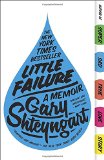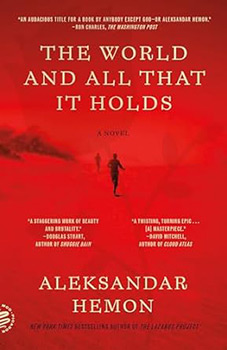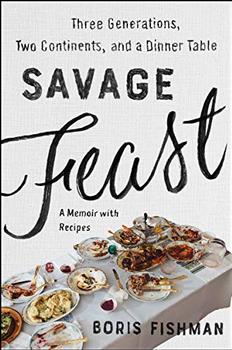Summary | Excerpt | Reviews | Beyond the book | Read-Alikes | Genres & Themes | Author Bio

Critics' Opinion:
Readers' Opinion:
First Published:
Jan 2014, 368 pages
Paperback:
Oct 2014, 368 pages
 Book Reviewed by:
Book Reviewed by:
Poornima Apte
Buy This Book
"Like most Soviet Jews, like most immigrants from Communist nations, my parents were deeply conservative," writes Gary Shteyngart in his engaging memoir, Little Failure. So one can imagine that of all the career paths the Shteyngarts had in mind for their only child, writing certainly wasn't one of them. "My mother was developing an interesting fusion of English and Russian and, all by herself, had worked out the term Failurchka, or Little Failure." "'What kind of profession is this, writer?' my mother would ask. 'You want to be this?' I want to be this."
And what a writer he has become! Over the years, Shteyngart has expertly wielded biting wit and razor-sharp intelligence to become one of contemporary fiction's foremost chroniclers of the immigrant experience. Now Little Failure, his memoir, shines light on the pith behind his two stellar works of fiction, The Russian Debutante's Handbook and Super Sad True Love Story.
Shteyngart starts by tracing the arc of his history from an asthmatic childhood in Leningrad (now St. Petersburg) to his eventual emigration to the United States, specifically Queens, as part of President Carter's grain for Jews program. While Shteyngart's tale of immigration is impressive in its own right, he is quick to remind us that the distances - metaphorical as well as literal - his forefathers traveled within the Soviet Union to escape oppression (not always successfully) were much more daunting and courageous.
Understandably, the United States with its excesses and a profusion of "Zenith televisions" feels like Candyland. "Coming to America after a childhood spent in the Soviet Union is equivalent to stumbling off a monochromatic cliff and landing in a pool of pure Technicolor," Shteyngart writes. The account of his bumbling assimilation into the land of plenty, with generous helpings of assistance from television, is in equal parts hilarious and moving. In one of the most remarkable episodes, Shteyngart describes his 13-year-old self coveting a hamburger at a rest-stop McDonald's - something his parents, who buy clothes by the pound, deem exceedingly extravagant. Instead, they cart in home-cooked beet salad while helping themselves to the free straws and napkins. Why must we always be at the margins of places, Shteyngart wonders. Why must "the Old World we have left behind [be] so far and yet deceptively near."
There are times when Shteyngart can be accused of too much sharing. Did we really need to know that just before the family left for the United States, Shteyngart was scared of a little green potty? "I'm too scared of falling in - and I can't get a kakashka out." No, thanks. Sections of his drug-fueled college days, while adding to the author's persona, also seem a tad drawn out - it's difficult to imagine many beyond his diehard fans (I am one of them) really getting much out of these accounts. Where Little Failure truly shines is in outlining the subtle pressures of conformity, of fitting in.
As much as his memoir succeeds in painting the travails of Shteyngart's experience as an immigrant straddling two cultures, it is the parts that deal with his problems with his parents that are deeply moving and his to own. It really is true that "the secret source of humor is not joy, it's sorrow." In Little Failure this applies both to Shteyngart's description of the Soviet Jewish experience and to his more immediate family struggles. Even the book's title masks layers of hurt and damage caused by parenting with total disregard for the loosely flung word. In an interview, Shteyngart has said that he's "known a lot of children of immigrants - Chinese, Korean, Indian parents - and from that part of the world, or my part of the world, the parents pretty much say whatever's on their mind. The American kind of filtering where you say, 'Well, I probably shouldn't say this because I'll hurt his feelings,' that just doesn't fit."
Fortunately for Shteyngart, he did have access to all things American including psychoanalysis. "This is America, and you can swap out the parts of yourself that don't work. You can rebuild yourself piece by piece," Shteyngart writes. And that is precisely what he does. It has taken years of treatment for him to make a shaky peace with his parents and the book sometimes reads like a written closure to the long shadows cast by their questionable parenting skills. Their opinions, he promises himself, will not rend his world asunder any more. "This is how they talk. This is how I never learned to talk. Not in Russian. Not in English. The supposedly funny banter with a twist of the knife. That's what I have my novels for." In this sense Little Failure is Shteyngart's version of the American rags-to-riches story.
The memoir stands out because it's much more than an immigrant's narrative. As Shteyngart movingly shows, the trials of assimilation that are a part and parcel of cultural displacement can hold no candle to the deep fissures that can be etched by toxic parenting. That other country can be just as alien, its inner private geographies just as painful to navigate.
![]() This review was originally published in The BookBrowse Review in February 2014, and has been updated for the
October 2014 edition.
Click here to go to this issue.
This review was originally published in The BookBrowse Review in February 2014, and has been updated for the
October 2014 edition.
Click here to go to this issue.

If you liked Little Failure, try these:

The World and All That It Holds
by Aleksandar Hemon
Published 2024
The World and All That It Holds―in all its hilarious, heartbreaking, erotic, philosophical glory―showcases Aleksandar Hemon's celebrated talent at its pinnacle. It is a grand, tender, sweeping story that spans decades and continents. It cements Hemon as one of the boldest voices in fiction.

by Boris Fishman
Published 2020
The acclaimed author of A Replacement Life shifts between heartbreak and humor in this gorgeously told, recipe-filled memoir. A family story, an immigrant story, a love story, and an epic meal, Savage Feast explores the challenges of navigating two cultures from an unusual angle.





The Flower Sisters
by Michelle Collins Anderson
From the new Fannie Flagg of the Ozarks, a richly-woven story of family, forgiveness, and reinvention.

The House on Biscayne Bay
by Chanel Cleeton
As death stalks a gothic mansion in Miami, the lives of two women intertwine as the past and present collide.

The Funeral Cryer by Wenyan Lu
Debut novelist Wenyan Lu brings us this witty yet profound story about one woman's midlife reawakening in contemporary rural China.
Your guide toexceptional books
BookBrowse seeks out and recommends the best in contemporary fiction and nonfiction—books that not only engage and entertain but also deepen our understanding of ourselves and the world around us.